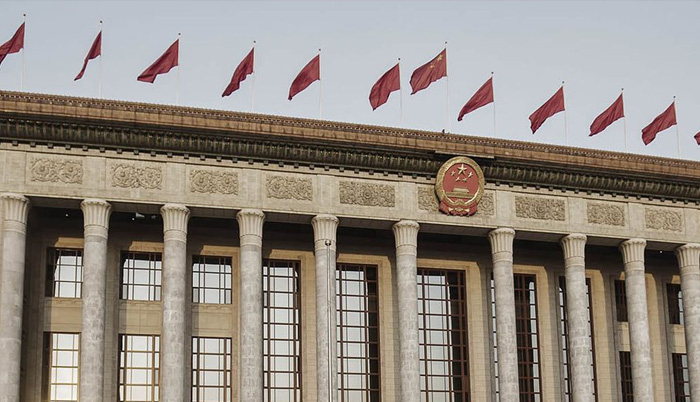![]() Home > World Business
Home > World Business
China's Deleveraging Campaign Takes On Toughest Target Yet

Photographer: Qilai Shen/Bloomberg
![]() July 21st, 2017 | 09:29 AM |
July 21st, 2017 | 09:29 AM | ![]() 1070 views
1070 views
CHINA
China’s deleveraging campaign is taking on its toughest target yet: the public sector itself.
While up to now policy makers have focused on a build-up of liabilities at smaller banks and big private-sector companies, President Xi Jinping has made clear that local government authorities and China’s behemoth state-owned enterprises too must restrain borrowing. Xi’s comments at a top financial-regulatory gathering last weekend were the latest signal of determination to head off any future destructive debt-bubble deflation.
It’s perhaps the hardest leverage nut to crack, because Communist Party officials have for decades risen through the ranks by borrowing to fund growth -- whether at local authority levels or atop an SOE monopoly. The party has kept a national growth target, making it a challenge to change cadres’ mentalities. But with the economy exceeding expectations now, time could be ripe to crack down on borrowing.
"Policy makers will likely seize this rare opportunity to reduce leverage in the economy in a deeper, longer and more thorough campaign," said Helen Qiao, chief greater China economist at Bank of America Merrill Lynch in Hong Kong. "We will see more measures being rolled out in the second half of 2017 and 2018," she said.
A key underlying problem has been China’s inefficient use of credit, particularly after the leadership team under Xi’s predecessor unleashed a record borrowing binge during the global crisis. Even before then, the country’s incremental capital-output ratio -- which measures how much extra output is yielded from additional investment -- was worse than other Asian economies during their rapid-development phases.
Before the crisis, China’s ICOR was about 4.4 (meaning it generated 1 yuan extra output for each 4.4 yuan invested), compared with 3.2 for Japan in the 1960s, according to Nomura Institute of Capital Markets Research. More recently, China’s ratio deteriorated to over 6, show data cited by the International Monetary Fund.
Top Priority
Xi’s remarks at the July 14-15 conference of top financial regulators showed he wants broad action to address wasteful borrowing. China should view curbing SOE leverage as "the priority of priorities," and hold officials accountable "for a lifetime" for building up regional debt. Rather than stressing the need to limit credit in the financial system, he focused on reducing borrowing in the entire economy.
"Focusing on cutting excess leverage in real economy, instead of in the financial sector" came as a surprise to some, said Zhu Haibin, chief China economist at JPMorgan Chase & Co. in Hong Kong. "Cutting leverage means the gap between credit growth and nominal GDP growth will narrow -- but that could have knock-on risks and drag on economic growth itself."
Gross domestic product climbed 6.9 percent in the three months through June compared with a year before, data released Monday showed, above the target of around 6.5 percent. Any move to set that target aside and reduce credit gains more systematically could unsettle bond and stock markets that have more recently grown comfortable with China’s pace of deleveraging. Yields on government and corporate bonds remain lower than highs reached in May and early June that followed steps to rein in shadow banking.
Five Years
Last week’s National Financial Work Conference was designed to set priorities for the coming five years, though some analysts see initial steps being taken even in coming months to execute Xi’s priorities. Among potential options for addressing SOE borrowing, economists cite:
Debt-for-equity swaps
Consolidation of the hundreds of state enterprises into a smaller group of national champions
Forcing bankruptcy onto insolvent "zombie" companies
Partial privatization, with stake sales used to pare back debt
"As the central government becomes extremely serious in curbing SOEs’ financial leverage and expresses zero tolerance of local governments’ inability to curb debt growth, more corporate defaults are expected," Raymond Yeung, the Hong Kong-based chief economist at Australia & New Zealand Banking Group Ltd., wrote in a note. "Banks would tighten their credit policy in the near term, risking the cash flows of some borrowers. Credit risks will increase."
When it comes to local authorities and their financing vehicles, borrowing recently has been heading in the other direction: a total of 834 billion yuan of debt sales has been announced so far in July, already the biggest amount since August last year. SOEs have also increased borrowing of late, with them planning 295 billion yuan of sales for July through Friday, according to data compiled by Bloomberg. JPMorgan estimates SOE debt at 90 percent of gross domestic product, making up the majority of total corporate debt at 165 percent.
"It’s encouraging to hear Xi name SOEs specifically because it gets the diagnosis right on the debt side," said Andrew Polk, co-founder of research firm Trivium China in Beijing. "But this is one place where we really need to wait and see some genuine action before we can believe that the government will actually address the issue."
Source:
courtesy of BLOOMBERG
by Bloomberg News
If you have any stories or news that you would like to share with the global online community, please feel free to share it with us by contacting us directly at [email protected]